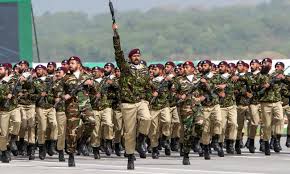Lawfare is quickly gaining speed and is becoming one of the most widely used tools of non-traditional warfare. The use of lawfare has exponentially increased because it helps countries put international pressure on other countries and shift the blame for not complying with International Law from themselves. India has also done this in the case
Lawfare is quickly gaining speed and is becoming one of the most widely used tools of non-traditional warfare. The use of lawfare has exponentially increased because it helps countries put international pressure on other countries and shift the blame for not complying with International Law from themselves. India has also done this in the case of Kashmir where it has many times dragged the issue under the carpet by put focus on other issues such as financing terrorism and FATF.
The event that gave lawfare its most recent shape was after the 9/11 attacks in New York, USA. After 9.11, terrorism emerged as the biggest threat to world peace and security. Following the 9/11 attacks, the United Nations passed two resolutions that can be labeled as the beginning of lawfare in the 21st century as Resolution 1267 imposed sanctions against those supporting Al-Qaeda and Osama Bin Laden. The US has gotten away by using the United Nations Security Council Resolution 1373 which ‘reaffirmed the inherent right of an individual and collective self-defense of states’. This has allowed the US to escape all accountability with regard to Afghanistan and the US was able to withdraw from the region while leaving Afghanistan to suffer.
The US and its allies including Canada, New Zealand, and the UK have all responded to Russia’s invasion by imposing sanctions. Some of the latest sanctions include economic measures that ban new investment in Russia, sanctions on two Russian financial institutions, the Alfa Bank and Sberbank along with sanctions on various Russian governmental officials and family members including Putin’s family members. While Russia is a strong country and Putin has responded back to the US but blocking central bank assets is a very drastic step that has only been applied before in countries such as Iran, Syria, and North Korea.
Humanitarian organizations and Non-Governmental Organisations have always been critical of sanctions because they harm the citizens of the state rather than the people who are responsible for the sanctioned policies. In this case, Putin is moving on with the invasion of Ukraine with the recent invasion of Mariupol but how will Kremlin mitigate the economic impact these sanctions will have? Ultimately, the result of worsening economic conditions will come on the Russian people. Therefore, there is a need to reassess the applicability of the UN sanctions. Sanctions must be capable of achieving the desired goals instead of massively affecting the people who had no role to play in the conflict. One of the theories as to why economic sanctions are applied is to put pressure on civilians who will put pressure on the Government but in the case of Russia, is the desired effect being achieved?
An example of the effects of the UN sanctions can be illustrated through the case study of the Ariana Afghan Airlines which was presumed to be ‘directly or indirectly controlled by the Taliban’. Sanctions contributed to the long-term decline of the airline, trade as well as health sectors. The suspension of the Ariana Airline flights cut off the main link between hospitals and medicinal drugs from the outside world causing a deterioration in the standard of health care in the country. The suspension also affected Afghanistan’s foreign trade. Due to travel restrictions, Afghanistan was deprived of a reliable and rapid means of communication with the rest of the world. Afghanistan also lost considerable income from international passengers and the lack of international links has disabled Afghanistan completely from any sort of foreign investment opportunities.
International organizations have also been quick to condemn Russia regarding the invasion. The International Criminal Court (ICC) has also launched an investigation into President Putin’s ‘war crimes’ in Ukraine. Furthermore, President Biden has also termed Russia’s activities in Ukraine as ‘genocide’. While neither Russia nor Ukraine are a state party to the Rome Statute, the ICC may still have jurisdiction over the situation as Ukraine issued a declaration under Article 12(3) of the ICC Statute granting jurisdiction to the Court. Interestingly, the United Nations General Assembly held a special emergency session for the first time since 1997. During the session, a resolution was adopted that called for Russia to be suspended from the Human Rights Council. All these moves seem to be tactics that have been adopted by the US and its allies to pressurize and isolate Russia.
One should not endorse Russia’s activities in Ukraine. What Russia is doing is wrong and an immediate stop should be put to its activities. However, what needs to be called out are the strategic maneuvers that have been used time and again by the US in order to isolate countries. The US has time and again deployed various tactics such as sanctions in order to advance its own strategic interests. The way the world is moving ahead with sanctions etc against Russia, why have the same not been done for Iran, Iraq, Palestine, and Pakistan? The international scrutiny should be the same for every country.
- Has the US Learned From its Experience in Afghanistan? - July 20, 2022
- US’ Lawfare against Russia - May 16, 2022
- Is the US really behind the regime- change? - April 23, 2022





















Leave a Comment
Your email address will not be published. Required fields are marked with *